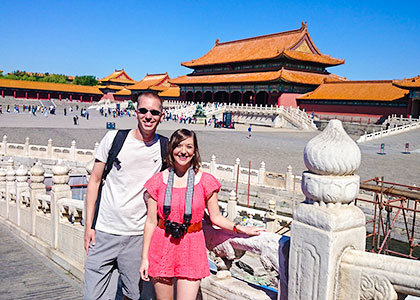20 New Tips For Picking China Tour Websites
Top 10 Tips For Shopping At Markets On The Streets Of China. Markets In China1. Start early and visit the markets early in the morning as vendors are setting up and may offer better deals to make their first sales.
Pro: Buying early allows you to have a greater selection and lets you bargain for more.
Cons: You have to wake up early. It may not work for all travel schedules.
2. Bring Cash
Tip: Most street market vendors prefer cash, but mobile payment options like WeChat Pay or Alipay are increasing in popularity.
Cash payments are easy to arrange and can aid in negotiations.
Con: Carrying cash can increase the risk of loss or theft in crowded areas.
3. Learn Basic Mandarin
It's helpful to know words like "Zhege Duoshao Quan?" (How much does this cost?) or "Pianyi Yidian Ba" (Can you lower the price?) It is a way to communicate more effectively.
Pro: Establishes rapport with vendors and shows appreciation for local culture.
Pro: A limited vocabulary can lead to miscommunications.
4. Inspection of Goods
Tip: Be sure to check all items thoroughly for any flaws or inconsistencies.
Pros: You'll receive exactly what you get for your.
Cons: It can be a time-consuming process and vendors can become angry.
5. Bargain Confidently
Tip: Don't hesitate to negotiate, as it's expected in most street markets. Reduce the price by at minimum 50-70 percent.
Pros: Bargaining is the best way to cut costs.
Cons: It is difficult for those unfamiliar with the process.
6. Beware of counterfeits
You should be cautious when buying brand name items such as bags, watches and other electronic items.
Pro: It can save you money by not buying counterfeits of poor quality.
Con: Genuine goods can be difficult to locate and cost more.
7. Local Customs to be Respected
Tip: Pay attention to how locals shop bargain, shop, and interact with vendors to adjust your style.
You can avoid cultural mistakes by mixing with.
Pro: Takes time to fully understand the customs.
8. Keep Valuables Secure
Tips: Use anti-theft bags or put phones and wallets in a secure place to prevent pickpockets at busy markets.
Reduces the chance of theft in areas with large traffic.
Pro: Extra security measures may seem restrictive or uncomfortable.
9. Try Before You Buy (Food)
Try to get samples of dried food or snacks before purchasing.
Pro Tip: Make sure you are satisfied with the taste and the freshness of the food you eat.
Con: Some sellers may insist on you buying after presenting a sample.
10. Know the Market's Focus
Tips: Every market has its own specialty, like the Yuyuan Market in Shanghai for souvenirs or Panjiayuan in Beijing for antiques. It is possible to research your needs and match them to the market you're going to.
The goal is to save time and focus.
Cons: It restricts spontaneity to the extent that you have to stick to your study.
Pros of Shopping in Street Markets
Unique Finds: You may find things that aren't readily sold in stores that are formal, like handmade crafts or local snacks.
Street markets tend to offer cheaper prices than malls, shops or shopping centers.
Cultural Experience: Getting to know the vendors and exploring markets is a great way to learn about local tradition.
One market will have everything from clothing to food and even souvenirs.
Pros and Cons of Shopping at Street Markets
The likelihood of finding copyright goods is a high likelihood of finding fake or inferior items.
The crowds at markets can be extremely busy, especially on weekends or holidays.
Pressure from Vendors: Certain vendors may employ pushy sales tactics, making the experience stressful.
The majority of purchases are not returnable or exchanged.
If you are prepared and follow these steps, you will be able to take advantage of the most of China's vibrant market streets. Take a look at the top view highlights of this attraction for more info including tours for the disabled, jiuzhaigou, splendid china tour.html, hua diao the most famous shaoxing yellow wine, top three buddhist temples in chengdu, entertainment in beijing, south luogu laneone of the oldest neighborhoods in beijing, snow beer the best selling beer in the world, popular beijing night markets, eating in urumqi and more.

Top 10 Tips On Ritual Practices When You Visit Famous Temples In China
1. Be mindful of the guidelines of your temple. Each temple will have their own set. Respect them, even when you are participating in rituals of sacred significance or entering sacred spaces.
Pro Respects the local culture and temple's sacred space.
Con: It's difficult to understand the rules for temples that have intricate rituals.
2. Be Quiet and Respectful
Tips: Keep your demeanor respectful and quiet while performing rituals, or in the temple. Do not talk loudly or laugh.
Pro: Creates peace for worshippers and shows reverence.
Con: If you are unfamiliar with the local culture and the environment The silence could be uncomfortable.
3. Dress modestly
Tips: Dress in respectful manner such as long pants dresses, or skirts and be careful not to expose your clothing. Certain temples offer scarves to cover the arms.
Pro: Shows respect for the sacred site and the worshippers who visit it.
Con: You may need more planning or a change of clothes for a warm day.
4. Observe the Offerings Ritual
Tip: If you'd like to take part in an offering (such as incense or fruits) Wait for other people to finish their rituals first and follow the instructions of the locals.
Pro You'll be able to integrate with the local culture and respect the sacred rituals.
Cons: Participating in the ritual can be uncomfortable if your understanding isn't clear. the meaning behind it.
5. You shouldn't interrupt a prayer or meditation
Tips: Avoid disturbing worshippers when they are in a spiritual practice. Do not take pictures or have conversations while others are in spiritual practice.
Pro: Represents culture respect and ensures that a calm and respectful atmosphere is maintained.
Cons: Taking pictures to remember them yourself can feel like an spy.
6. Lighting of Incense
Tip. Incense lighting as part of an Chinese temple ritual is very common. Incense is lit to show gratitude to the gods. In your hands, make a bow when you present it.
Pro: It demonstrates that you're actively participating in temple rituals and observing the customs.
Con: Incense might not be a common experience for all travelers.
7. Don't touch sacred statues and objects
Be careful not to touch sacred statues or objects of worship. Also, avoid touching the temple or any relics, unless you have been specifically invited.
Pro: Protects the sanctity of the temple and the sacredness of the place.
Con: You may be lost if you do not know the boundaries of temples.
8. Keep an eye on the Temple Hierarchy
A tip: There are different levels within specific temples. Beware of walking on altars or sacred statues. Be aware of the proper place to bow.
Pro-Respect the temple and maintain decorum.
Cons The hierarchical structure may not always be logical, so it takes extra effort to determine what is acceptable.
9. Keep Offerings Humble
Tips: Make sure that the presents are modest and according to the customs of your area if you choose to present an offering (flowers or fruit). Expensive and extravagant gifts may be seen as inappropriate.
Pro: demonstrates humility and aligns themselves with local customs.
Cons: You may not be sure what type is most appropriate for you without the help of a local expert.
10. Participate in Temple Events When Invited
Tips. Some temples hold special events like prayer, celebrations or days. If you're asked to participate, join respectfully, following the direction of the crowd.
Pro: You'll be more engaged with the temple and the local tradition.
Con: Taking part in unfamiliar rituals can feel uncomfortable and awkward when the procedure isn't followed.
The negatives of attending rituals at Temples
Involving in rituals can aid in understanding Chinese culture and tradition.
Respectful interactions: Interacting with temple staff and other locals in a respectful manner can help build positive relations.
Personal Growth: Participating in practices of spiritual or religious significance can be a meaningful and enriching experience.
Enjoy a memorable experience by engaging in temple ceremonies.
Cons of Observing Temple Ritual Practices
Unknown. Rituals can be confusing for new visitors. They can lead to confusion, discomfort, or errors.
Cultural Mistakes If performed incorrectly it can cause offense or miscommunications.
Language Barriers - You might not be able to comprehend the meaning of instructions and rituals due to the language barrier.
The physical discomfort may be experienced when performing specific rituals. For example sitting or bowing for long periods of time could be physically uncomfortable.
These suggestions will allow you have a pleasant and meaningful experience at China's famous temples. See the top rated explore the wonders of this attraction for website advice including eating in urumqi, xiamen, eating in lanzhou, entertainment in beijing, eating in lanzhou, top three buddhist temples in chengdu, honey lake country club, datong beijing high speed railway schedule and timetable, xiang cuisine.html, eating in shangri la and more.
